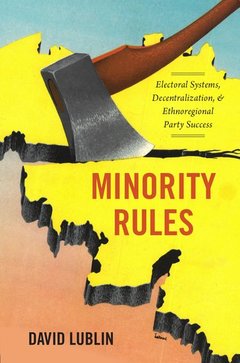Description
Minority Rules
Electoral Systems, Decentralization, and Ethnoregional Party Success
Author: Lublin David
Language: English
Subject for Minority Rules:
Approximative price 164.74 €
In Print (Delivery period: 21 days).
Add to cart
Minority Rules
Publication date: 01-2015
Support: Print on demand
Publication date: 01-2015
Support: Print on demand
Approximative price 51.58 €
In Print (Delivery period: 21 days).
Add to cart
Minority Rules
Publication date: 01-2015
552 p. · 15.8x23.5 cm · Paperback
Publication date: 01-2015
552 p. · 15.8x23.5 cm · Paperback
Description
/li>Biography
/li>
When we think of minorities--linguistic, ethnic, religious, regional, or racial--in world politics, conflict is often the first thing that comes to mind. Indeed, discord and tension are the depressing norms in many states across the globe: Iraq, the former Yugoslavia, Sudan, Israel, Sri Lanka, Burma, Rwanda, and many more. But as David Lublin points out in this magisterial survey of minority-based political groups across the globe, such parties typically function fairly well within larger polities. In Minority Rules, he eschews the usual approach of shining attention on conflict and instead looks at the representation of minority groups in largely peaceful and democratic countries throughout the world, from the tiniest nations in Polynesia to great powers like Russia. Specifically, he examines factors behind the electoral success of ethnic and regional parties and, alternatively, their failure to ever coalesce to explain how peaceful democracies manage relations between different groups. Contrary to theories that emphasize sources of minority discontent that exacerbate ethnic cleavages--for instance, disputes over control of natural resource wealth--Minority Rules demonstrates that electoral rules play a dominant role in explaining not just why ethnic and regional parties perform poorly or well but why one potential ethnic cleavage emerges instead of another. This is important because the emergence of ethnic/regional parties along with the failure to incorporate them meaningfully into political systems has long been associated with ethnic conflict. Therefore, Lublin's findings, which derive from an unprecedentedly rich empirical foundation, have important implications not only for reaching successful settlements to such conflicts but also for preventing violent majority-minority conflicts from ever occurring in the first place.
David Lublin is Professor of Government at American University and author of The Paradox of Representation and The Republican South.
© 2024 LAVOISIER S.A.S.




